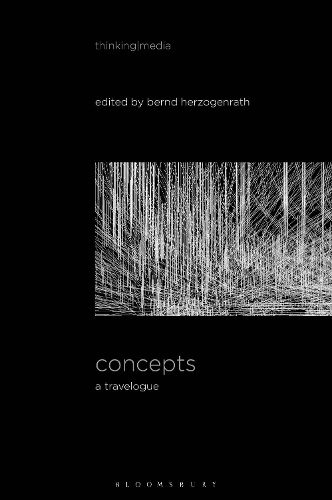
concepts: a travelogue
(Paperback)
Available Formats
Publishing Details
concepts: a travelogue
By (Author) Professor Bernd Herzogenrath
Bloomsbury Publishing PLC
Bloomsbury Academic USA
27th June 2024
United States
Classifications
Tertiary Education
Non Fiction
Philosophy
302.2301
Physical Properties
Paperback
406
Width 140mm, Height 216mm
Description
This book foregrounds that English monolingualism reduces both our linguistic and conceptual resources, presenting concepts from the cultures of 4 continents and 26 languages. Concepts seem to work best when created in the interspace between theory and praxis, and between philosophy, art, and science. Deleuze himself had generated many concepts in this encounter between philosophy and non-philosophy, including his ideas of affects and percepts, of becoming, the stutter, the rhizome, movement-image and time-image, the rhizome. What happens, if instead of "other disciplines," we take other cultures, other languages, other philosophies Does not the focus on English as a hegemonic language of academic discourse deny us a plethora of possibilities, of possible Denkfiguren, of possible concepts Each contributor explores ideas that are key to thinking in their language about sound and silence, voice and image, living and thinking, the self and the world - while simultaneously addressing the issue of translation. Each chapter demonstrates that translation itself is a way of invention, rather than just a rendering of concepts from one system in terms of another. This collection acts as a travelogue. The journey does not follow a particular trajectorysome countries are not on the map; some are visited twice. So, there is no claim to completeness involved hereit is rather an invitation to answer to the call.
Reviews
In this bold collection, Bernd Herzogenrath has gathered together an extraordinary cadre of global authors to explore concept creation, a legacy that the oeuvre of Deleuze and Guattari has left us with. As a travelogue, it is a call to the field to decenter its Western Philosophical bias of English as the lingua franca, and to grasp a media philosophy that infiltrates thought where materiality is always in play. The 33 essays explore the relays between philosophy, art and science, creating interesting, remarkable, and important concepts that open up new worlds and vistas. * Jan Jagodzinski, Professor, Visual Art and Media Education, University of Alberta, Canada *
This book carves out a space for the multiplicity of concepts, offering a contribution not only to philosophy and media theory, but also to the cultural politics of academia: whose language are we writing in Against the hegemony of Anglo-American language and the standardized format of writing the global academia is meant to be pressed in the joyful encounters between languages are here one contribution to the on-going task of decolonizing the expressive qualities of thinking. * Jussi Parikka, Professor in Digital Aesthetics and Culture, Aarhus University, Denmark, and FAMU, Czech Republic *
If concepts are a form of seeing-technology that helps us to see the world anew, then what could be more intellectually stimulating and enriching than a veritable smorgasbord of concepts gathered from all over the world This is a truly remarkable multi-lingual collection of concepts that read together generates both resonance and noise as the world is seen through their coruscating light. * Ian Buchanan, Professor Critical Theory, University of Wollongong, Australia *
Author Bio
Bernd Herzogenrathis Professor of American literature and culture at Goethe University of Frankfurt am Main, Germany. He is the author of An Art of Desire: Reading Paul Auster (1999) and An American Body|Politic: A Deleuzian Approach (2010) and editor of The Farthest Place: The Music of John Luther Adams (2012) and Deleuze|Guattari & Ecology(2009). His latest publications include the collections The Films of Bill Morrison. Aesthetics of the Archive (2017), Film as Philosophy (2017), and Practical Aesthetics (Bloomsbury, 2020).
